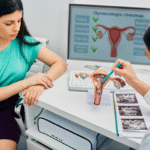A detailed guide to pregnancy care, covering every stage from conception to delivery, to ensure the health of both mother and baby.
Pregnancy is one of the most transformative phases in a woman’s life. Proper pregnancy care is essential for the health and safety of both the mother and the developing baby. This journey requires consistent medical support, lifestyle adjustments, and attention to emotional well-being. By understanding what to expect and following professional guidance, women can navigate pregnancy with confidence and peace of mind.
Normal pregnancy care involves regular monitoring, healthy habits, and open communication with healthcare providers. Each stage of pregnancy brings unique changes and needs, and early preparation helps ensure a smoother experience for both mother and child.
Prenatal Care: The First Step
The initial step in pregnancy care is prenatal visits. Early consultations with a gynecologist confirm pregnancy, estimate due dates, and identify any potential risks. These appointments often include routine blood tests, urine analysis, and screenings for conditions like gestational diabetes or anemia.
Regular ultrasounds monitor the baby’s growth, check organ development, and detect possible complications early. Through these assessments, healthcare providers can provide personalized guidance and reassurance, helping mothers feel supported and informed throughout their pregnancy.
Nutrition and Physical Health
Nutrition plays a crucial role in supporting maternal and fetal health. A diet rich in folic acid, iron, calcium, and protein aids proper development and reduces the risk of birth defects or complications. Adequate hydration, limiting caffeine, and avoiding alcohol and tobacco are also essential components of a healthy pregnancy.
Physical activity, such as prenatal yoga, swimming, or light walking, helps manage stress, improves circulation, and supports healthy weight gain. Exercise can also reduce common pregnancy discomforts, like back pain or fatigue. However, any fitness routine should be approved by a gynecologist to ensure safety for both mother and baby.
Mental and Emotional Well-Being
Pregnancy is not only a physical journey but also an emotional one. Hormonal changes and life adjustments can bring anxiety, mood swings, and stress. Seeking support from family, joining prenatal classes, or consulting counselors can help women maintain emotional balance.
Mindfulness practices, meditation, and connecting with other expectant mothers can provide reassurance and reduce feelings of isolation. Prioritizing mental health alongside physical health ensures a more positive pregnancy experience and strengthens readiness for childbirth and motherhood.
Delivery and Postpartum Care
Delivery planning is a critical aspect of pregnancy care. Women should discuss birth options with their gynecologist, including normal delivery, C-section, or pain management strategies. Understanding the benefits and risks of each approach helps in making informed decisions tailored to individual needs.
Postpartum care extends the journey beyond delivery. Adequate rest, proper nutrition, and emotional support are essential for recovery. Monitoring for postpartum complications such as infections, mood disorders, or breastfeeding challenges ensures early intervention. Follow-up visits with healthcare providers help mothers regain strength and confidence while adjusting to life with a newborn.
With continuous medical guidance, lifestyle adjustments, and strong family support, pregnancy can be a safe, fulfilling, and transformative experience. By prioritizing care at every stage, women can protect their own health while providing the best start for their babies.








